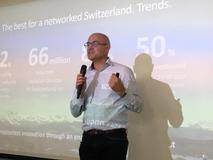Interview with Grégory Leproux, Head of New Business Development and the Digital Lab at Swisscom
03.10.2017
Grégory Leproux is the Head of New Business Development and Head of the Digital Lab, Digital Enterprise Solutions, at Swisscom. He is responsible for finding new growth opportunities, crowdsourcing ideas and fostering innovation within the Lab. He was previously the Vice President of the innovation and business development at the Swisscom Outpost in Silicon Valley. Swisscom is a major partner of the EdTech Vertical program as well as venturelab's. Grégory Leproux talks about the importance of education through technology and gives some tips to the eleven startups selected for the program.
 Grégory Leproux talked about about the importance of education through technology at the EdTech program opening ceremony.
|
What is the Swisscom Digital Lab?
The Swisscom Digital Lab was created based on the partnership between the Swiss Federal Institute of Technology Lausanne (EPFL) and Swisscom with the objective of collaborating on applied research projects. The projects are typically realized between the EPFL labs and Swisscom’s business units. The Digital Lab works also with students and provides challenges for their master projects.
Moreover, the Lab’s workspace and events program are designed to share knowledge within the innovation community in the Western part of Switzerland. Finally, the lab also provides the right set of tools and expertsfor the enterprises who want to develop prototypes or explore new business opportunities.
What is the role of Swisscom within the EdTech vertical program?
Swisscom is one of the sponsors and partners of the EdTech vertical program. Learning is a lifelong journey and we are interested in solutions that are focused on corporate learning. We need to be able to provide the right framework and environment to our employees to support them in a continuous learning process.
Why do you think a program like EdTech is important?
The world is changing extremely fast but we are still teaching the same way as fifteen years ago. If we don’t do anything to change it faster with the help of the private sector, kids, teenagers and grown-ups will not be able to adapt fast enough. We need to take action from preschools to universities and corporations to make people quickly adaptable in a digital world.
How do you define innovation?
Reducing customer friction, solving the right thing at the right time in an impactful manner.
Why do you think Switzerland is the right place for this program?
Switzerland has one of the best education systems in the world and many countries are looking at us as a role model for improving their own education system. Recently, the United States have shown an interest in reproducing the Swiss Apprenticeship model. We are a leading place for some of the Kickstart Accelerator verticals and education is one of them, so we have to continue building on our assets.
What advice would you like to give to the ten digital education startups?
They should really focus on the major problem they are trying to solve and be sure it’s a real one by talking with as many customers as they can. They need to test their market and do customer development interviews before trying to sell anything. Customer-centricity is key. If it’s a more mature startup, then it should put efforts on maximum growth (speed is the key).
Why is it important to attract startups in Switzerland?
In Switzerland, there are approximately 300'000 SMEs and startups will be the new SMEs. Therefore, we need to be able to attract startups from outside as we did with large corporations or non-governmental organizations because startups are a new form of organizations. The technology, the talent and a very stable economy are just a few factors that make Switzerland a place where they can flourish.
What’s next for the Swiss startup scene?
We need more capital risk investment in Switzerland and the scene will then develop even more. The market is global so we need to invest accordingly to help them reach their international market.
Bonus questions
In 10 years, what do you think the next big innovation will be that people might be laughing at today?
We will have cracked the code on how to build biological species and will apply it to manufacturing.
You spent almost four years in Silicon Valley. What are you bringing back to Switzerland?
I’m trying to bring a new perspective. I’m constantly challenging some of the projects, if it makes sense to work on certain things and if it’s impactful enough. It’s important to stay focus on the biggest problems and not over optimize something that already exists. I’m also bringing my network to create positive “collision” between corporates, startups and others.


